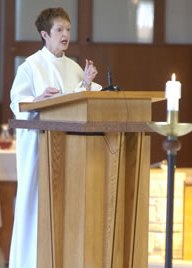Archbishop Flynn Ends Lay Preaching
As many as 29 parishes in the Archdiocese of St. Paul and Minneapolis have used lay preachers at Mass during the past 25 years. In January, however, Archbishop Harry Flynn instructed pastors to discontinue the practice. He gave his retirement date of May 2, 2008 as the time by which parishes should develop a “pastoral plan” to end lay preaching at Mass.
In his January letter to pastors, Archbishop Flynn referenced the 2004 Vatican instruction Redemptionis Sacramentum, which called eucharistic lay preaching – a non-ordained person reflecting on the Gospel reading at the place in Mass usually reserved for a homily by a priest or deacon – a liturgical abuse.
Many lay preachers have expressed “enormous grief and anger” over the directive to stop the practice, said Patricia Hughes Baumer, who co-founded the lay preaching training organization Partners in Preaching with her husband, Fred, in 1997.
Proponents of lay preaching argue that canon law allows the practice and that both the congregation and pastors benefit from hearing Gospel reflections from diverse voices.
Archbishop Flynn told the local diocesan paper that he moved to formally eliminate lay preaching in his diocese after he became aware that the number of parishes with lay preachers was far larger than he realized.
For parishioners accustomed to hearing lay people preach on the Gospel, and for the lay preachers themselves, understanding and accepting this change has proven difficult.
Ruth Hunt, 52, a parishioner at St. Joseph in New Hope, MN, has been preaching for 13 years. When she first heard that lay preaching would end in her parish, she was filled with a very deep sadness and a sense of loss. The response of many St. Joseph’s parishioners was similar, she said.
Frank Schweigert, 57, preaches at St. Francis Cabrini. He grew up in rural Wisconsin where his father sometimes preached in the absence of a priest. He sees lay preaching tied into the Archdiocese’s Evangelization Initiative and lay people’s “ownership of the Gospel.”
After Vatican II encouraged greater participation of the lay faithful in the Mass, some pastors across the nation began to invite their parishioners to preach during the liturgy. Lay preaching differs from a homily, which is reserved for a priest or deacon.
Even if a parish had three full-time priests it would benefit from lay preachers, said Father Bob Hazel, a retired priest of the archdiocese. When he became pastor of St. Joseph nine years ago, he inherited its lay preaching tradition.
“A good part of preaching is to witness to one’s faith – we’re not just up there to give catechism,” Father Hazel said. “Lay preachers can witness to their faith in terms of the difficulty, the problems in the business world, work-a-day world, and in families, and priests just can’t do that in the same way.”
Lay preaching also brings a woman’s perspective to the Gospels, Baumer said. “The suppression of lay preaching is simultaneously the suppression of female voices, because no matter how God has gifted a lay woman…to break open the Word, the community will not have access to that word as it gathers on Sunday,” she said.
Was the banning of lay preaching by Archbishop Flynn a parting gift to his successor, the more conservative John Nienstedt; or, is the trend toward “liturgical purity” part of an effort to undermine the growing democratization of the Church?
